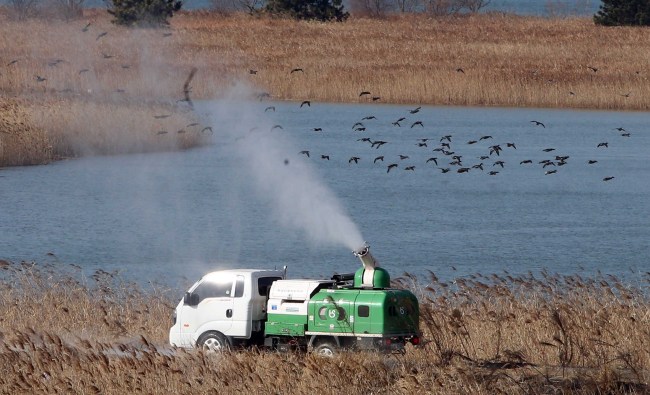 |
Quarantine officials take preventive measures to control bird flu in Eulsukdo, a migratory bird habitat in Busan on Monday. (Yonhap News) |
The South Korean government stepped up its efforts to prevent the bird flu from spreading further following the report of another suspected infection case on Tuesday.
In a sign demonstrating the gravity of the situation, the Ministry of Agriculture, Food and Rural Affairs extended the geographical limit within which poultry must be immediately slaughtered. All poultry within a 3-kilometer radius from a virus-infected farm will be slaughtered as a preventive measure. Previously, the mandate for culling was set at a 500-meter radius.
One additional suspected case of bird flu was reported earlier in the day at a duck farm in Gochang-gun, North Jeolla Province. The farm in the southeastern region is located 19 kilometers from the one where the avian influenza broke out last week.
The quarantine authorities were immediately dispatched to the suspected site to conduct an investigation. The results are expected by around Thursday.
As of Tuesday, three cases of bird flu infection were officially confirmed in North Jeolla Province ― one in Gochang-gun and two in Buan-gun.
The ministry has identified a dozen farms where infection is suspected within a 3-kilometer radius from the three confirmed farms, and all poultry within those sites were slaughtered to prevent the spread.
So far, more than 200,000 ducks have been culled. Whether they were infected with the bird flu will be confirmed later this week.
Officials suspected that a group of migratory birds living in a reservoir in the province might be the main source of contagion.
A large number of Baikal teals were found dead last Friday in the Dongrim reservoir. It was later confirmed that they were infected with the highly pathogenic H5N8 strain.
Officials said the birds in the region normally move 30 to 40 kilometers a day, affecting surrounding regions of the reservoir. These include Gochang-gun and Buan-gun at the western part of the reservoir, they added.
This is the first time the highly pathogenic H5N8 strain has broken out in South Korea. The strain has never been known to infect humans, the Ministry of Health and Welfare said.
It is the first detected case of bird flu since May 2011, when over 3 million poultry had to be culled. That particular bird flu scare lasted for about five months.
South Korea was hit by bird flu four times in the past.
By Lee Hyun-jeong (
rene@heraldcorp.com)






![[Herald Interview] 'Trump will use tariffs as first line of defense for American manufacturing'](http://res.heraldm.com/phpwas/restmb_idxmake.php?idx=644&simg=/content/image/2024/11/26/20241126050017_0.jpg)
![[Exclusive] Hyundai Mobis eyes closer ties with BYD](http://res.heraldm.com/phpwas/restmb_idxmake.php?idx=644&simg=/content/image/2024/11/25/20241125050044_0.jpg)
